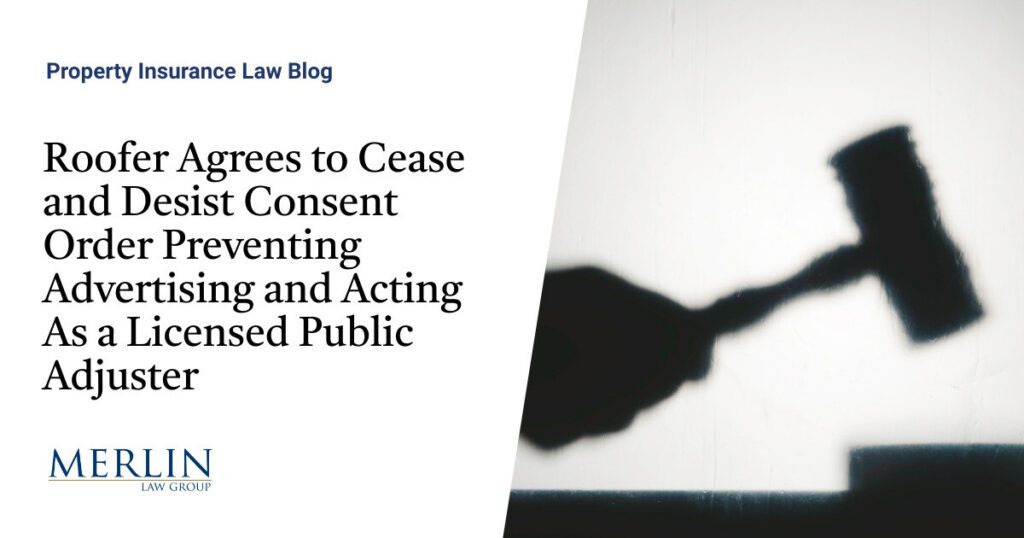Roofer Agrees to Cease and Desist Consent Order Preventing Advertising and Acting As a Licensed Public Adjuster

As a follow-up to my post, Everybody Must Follow the Law—Insurance Restoration Contractors Need to Stop Acting as Public Adjusters or Face Fines and Class Action Lawsuits, a Consent Order 1 was recently issued by the Iowa Insurance Commissioner in which Darren Reeves and his companies, Darren Reeves Roofing LLC and Darren Reeves Construction LLC, were found to have engaged in unlicensed public adjusting activities. This case provides important lessons for contractors and insurance professionals about the strict separation between contracting and public adjusting services.
The investigation revealed that Reeves and his companies advertised and performed public adjusting services without proper licensing. Through their website, Facebook page, and direct communications with potential clients, they promoted their ability to “work with insurance companies” and handle insurance claims on behalf of property owners. In one particularly telling instance, Reeves told an undercover investigator that he would “handle everything” with the insurance company, clearly stepping into the role of a public adjuster.
A key incident involved Reeves’s work with a commercial farm business, M&M LLC, where he negotiated directly with Farm Bureau Insurance regarding claim settlements and Xactimate estimates. When Farm Bureau refused to modify their estimate as requested, Reeves sent a confrontational email threatening to involve a licensed public adjusting firm. This type of direct negotiation with insurers is precisely what Iowa law reserves for licensed public adjusters.
The case highlights several critical compliance issues. First, Iowa Code § 522C.4, like most public adjuster licensing codes and regulations throughout the United States, explicitly prohibits anyone from operating as or representing themselves as a public adjuster without proper licensing. Second, under Iowa Code § 103A.71(3), residential contractors are specifically barred from representing or negotiating on behalf of property owners regarding insurance claims. These regulations create a clear boundary between construction services and claims adjusting that contractors must respect.
For those representing policyholders, this case reinforces the importance of maintaining proper licensing and understanding the strict limitations on contractor involvement in the claims process. While contractors may have valuable expertise in identifying damage and providing repair estimates, they must be careful not to cross the line into public adjusting activities.
In Everybody Must Follow the Law—Insurance Restoration Contractors Need to Stop Acting as Public Adjusters or Face Fines and Class Action Lawsuits, I noted the following lesson for all restoration contractors:
[I]t is evident that these laws and actions violating them are on the minds of insurance regulators. Restoration contractors can expect enforcement of these laws and should refrain from acting or contracting to be public adjusters if the applicable state law prohibits the same.
To ensure compliance, I urge all insurance restoration contractors to get a competent legal opinion from an attorney who knows about these issues, will review the advertising, and approve the contracts that are to be signed by policyholders needing restoration or catastrophe work. If the contracts are not legal and violate the law, the amounts charged may end up being forfeited. Worse, if the contract as written is illegal, it could provide a basis for a class action lawsuit where all monies obtained by such illegal contracts are voided.
The consent order serves as a reminder that state insurance regulators take these violations seriously. Roofers and restoration contractors play a crucial and important role in recovery after a loss. However, all contractors who participate in or advertise that they offer claims adjustment services are subject to disciplinary and other civil lawsuits accusing them of acting as public adjusters and breaking the law. This case and Consent Order highlight the importance of ensuring that all parties involved in the claims process are operating within their proper roles.
I predict that more state insurance commissioners will follow with similar actions. Texas started these types of enforcement actions, as noted in Stonewater Case Decided for Texas Department of Insurance and Against the Free Speech Arguments Which Would Have Gutted Public Adjusting Licensing Laws. Iowa’s successful prosecution of similar cases starts a trend.
Thought For The Day
“Have the courage to say no. Have the courage to face the truth. Do the right thing because it is right.”
—W. Clement Stone
1 In the Matter of Darren Reeves Roofing, Div. Case No. 122515 [Order and Consent to Order] (Iowa Ins. Comm. Dec. 11, 2024).



